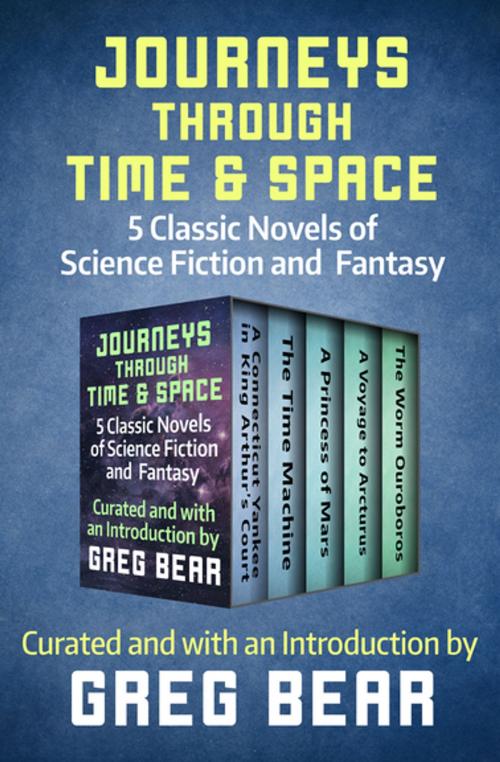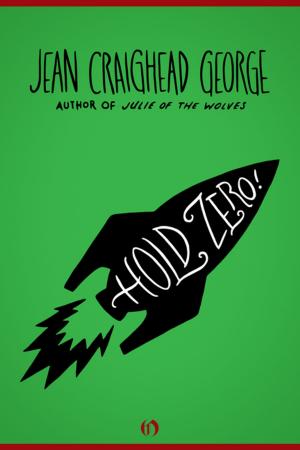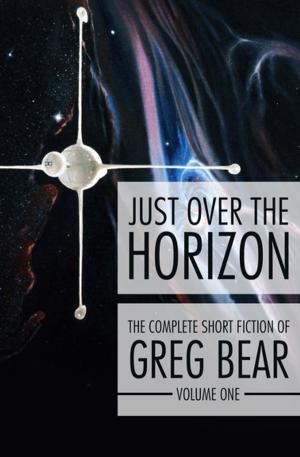Journeys Through Time & Space
5 Classic Novels of Science Fiction and Fantasy
Fiction & Literature, Classics, Short Stories, Science Fiction & Fantasy, Science Fiction| Author: | H. G. Wells, E. R. Eddison, David Lindsay, Edgar Rice Burroughs, Mark Twain | ISBN: | 9781504045643 |
| Publisher: | Open Road Media | Publication: | July 11, 2017 |
| Imprint: | Open Road Media Sci-Fi & Fantasy | Language: | English |
| Author: | H. G. Wells, E. R. Eddison, David Lindsay, Edgar Rice Burroughs, Mark Twain |
| ISBN: | 9781504045643 |
| Publisher: | Open Road Media |
| Publication: | July 11, 2017 |
| Imprint: | Open Road Media Sci-Fi & Fantasy |
| Language: | English |
A Nebula Award winner presents tales that shaped modern science fiction and fantasy—five complete novels by Mark Twain, H. G. Wells, and more.
In this handpicked collection, New York Times–bestselling author Greg Bear travels back to the late nineteenth and early twentieth centuries, when novelists let their imaginations soar beyond conventional boundaries of time and space and contributed to the emergence of imaginative new literary genres.
In 1889, Mark Twain introduced Americans to time travel in A Connecticut Yankee in King Arthur’s Court, in which a hard-headed New Englander is sent back through history to the age of chivalry. Six years later, H. G. Wells propelled an intrepid inventor into the far future via The Time Machine; there, our fearless hero discovers a nightmarish evolutionary scenario in which technologically advanced but mutated Morlocks dwell underground, preying on the innocent aboveground Eloi.
In 1912, long before Ray Bradbury or Star Wars, Edgar Rice Burroughs imagined the first wildly popular alternative fantasy/alien culture with A Princess of Mars, transporting readers from Arizona to the red planet, where Confederate soldier John Carter is swept up in another kind of civil war and seduced by a gorgeous red-hued princess.
In 1920, Scottish novelist David Lindsay presented A Voyage to Arcturus, an interstellar quest for truth as well as an inquiry into the nature of good and evil that inspired generations of fantasy writers to come. And in 1922, E. R. Eddison turned the planet Mercury into a fantasy version of Earth where demons and witches wage war on a Homeric scale in The Worm Ouroboros.
With an insightful introduction, Bear celebrates the writers who first swept readers away to other times and worlds—and blew their minds in ways that altered our literary landscape and collective imagination forever.
A Nebula Award winner presents tales that shaped modern science fiction and fantasy—five complete novels by Mark Twain, H. G. Wells, and more.
In this handpicked collection, New York Times–bestselling author Greg Bear travels back to the late nineteenth and early twentieth centuries, when novelists let their imaginations soar beyond conventional boundaries of time and space and contributed to the emergence of imaginative new literary genres.
In 1889, Mark Twain introduced Americans to time travel in A Connecticut Yankee in King Arthur’s Court, in which a hard-headed New Englander is sent back through history to the age of chivalry. Six years later, H. G. Wells propelled an intrepid inventor into the far future via The Time Machine; there, our fearless hero discovers a nightmarish evolutionary scenario in which technologically advanced but mutated Morlocks dwell underground, preying on the innocent aboveground Eloi.
In 1912, long before Ray Bradbury or Star Wars, Edgar Rice Burroughs imagined the first wildly popular alternative fantasy/alien culture with A Princess of Mars, transporting readers from Arizona to the red planet, where Confederate soldier John Carter is swept up in another kind of civil war and seduced by a gorgeous red-hued princess.
In 1920, Scottish novelist David Lindsay presented A Voyage to Arcturus, an interstellar quest for truth as well as an inquiry into the nature of good and evil that inspired generations of fantasy writers to come. And in 1922, E. R. Eddison turned the planet Mercury into a fantasy version of Earth where demons and witches wage war on a Homeric scale in The Worm Ouroboros.
With an insightful introduction, Bear celebrates the writers who first swept readers away to other times and worlds—and blew their minds in ways that altered our literary landscape and collective imagination forever.















